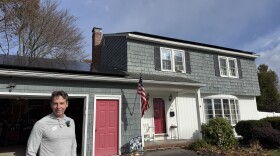Gov. Chris Sununu signed into law last week a new process to help community solar programs for low and moderate income residents get off the ground.
Community solar projects can help bring the economic benefits of solar – the extra credits that those with solar panels see on their monthly bills – to Granite Staters who don’t have solar power themselves.
There are a lot of reasons why someone might not be able to put solar panels on their home, said Jude Nuru, director of community solar initiatives for New Hampshire at ReVision Energy. The roof might not work for an installation, or a family might not have the up-front money to pay for panels.
“Some people also live in multi-family apartments where there is a landlord. Maybe you are living in a rental property, and you want solar, and your landlord is not willing to install solar,” he said.
But, Nuru said, matching a community solar project with customers has been one big challenge for solar developers, among other factors that create a difficult environment for developments in New Hampshire.
“Eversource, for example, has the electricity or fuel assistance programs, and they know the individuals that are on it. So it's much easier for a utility like Eversource to be able to locate where these customers can be found,” he said.
Under the new law, New Hampshire’s Department of Energy will create a process for matching developers with customers. The state’s utility companies will share a list of their customers who would qualify for a lower and moderate income community solar program, developers will register their projects with the state, and the Department will select households to enroll.
Those enrolled would see a credit on their electricity bill, and households could opt-out if they wish.
A fix for the challenge of finding customers could create an impetus for more community solar development in the state, Nuru said.








